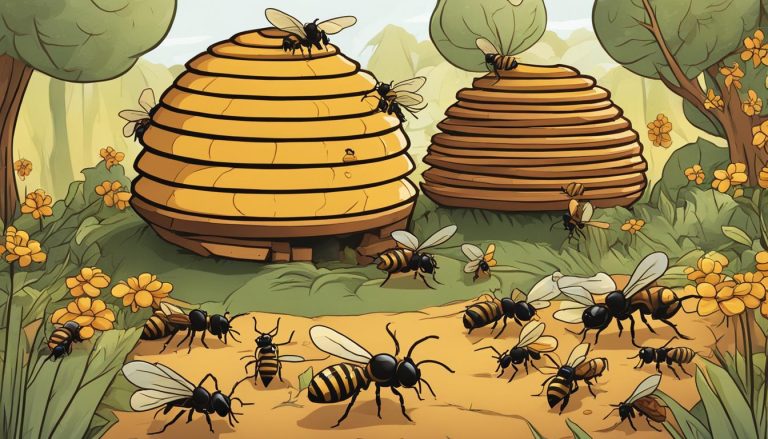G’day mates! Having trouble with pesky ants? No worries, we’re here to sort it out! Let’s talk about ant control and what kills ants. Getting rid of ants might seem as easy as pie, but there’s a bit more to it. To keep ants from marching one by one into our homes, we’ve got to think about preventing ants and proper ant extermination.
Some older tricks for battling ants are just a quick fix. They might scare ants off for a little while, but won’t stop them for good. Instead, we need to use smarter ways that trick ants into taking the bait back to their queen, which really does the trick! In Australia, many of us trust products like ANTHEM Ant Granules, Synergy Pro Ant Bait, and AMDRO ANT Bait. Just remember, it’s important to follow the directions on the label to make sure it works a treat.
Key Takeaways
- What kills ants: Newer bait products are better than old sprays or powders.
- Ant extermination: Quality products need to get to the queen to end the problem.
- Preventing ants: Use baits that ants carry home to knock out the whole colony.
- Follow instructions: Always use products as the label says for the best results.
- Have a go with recommended products: ANTHEM, Synergy Pro, and AMDRO are top picks for many Aussies tackling ant issues.
The Antagonists of Your Home: Identifying Common Ant Varieties
When it comes to ant removal in Australia, knowing your enemy is half the battle. Here’s a rundown of the usual suspects you might encounter around your home.
Carpenter Ants: Timber Threats
These burly insects can undermine wooden structures, making them an unwelcome presence in homes. Be on the lookout for tiny wood shavings that reveal their hideouts.
Fire Ants: Small Size, Big Sting
While small, fire ants pack a powerful punch with their painful sting. Their presence is marked by sizeable soil mounds and aggressive behavior.
Pharaoh Ants: Split to Conquer
Distinctive for their divisive tactics, Pharaoh ants can rapidly populate new areas by splitting their colony when disturbed.
Odorous House Ant: Unpleasant Invaders
A crushed odorous house ant releases a foul scent, and their penchant for sweets can lead them straight into your pantry.
Pavement Ants: Public Walkway Pests
Often spotted marching in lines on pavements, these ants won’t hesitate to enter your home in search for food and shelter.
Familiarising yourself with these pesky inhabitants is the first step towards implementing efficient natural ant repellent strategies and ensuring your home remains ant-free. Here’s a quick guide to help you identify them:
| Type of Ant | Appearance | Preferred Habitat | Control Tips |
|---|---|---|---|
| Carpenter Ants | Large, black or dark brown | Moist wood | Seal wood cracks; keep areas dry |
| Fire Ants | Reddish-brown, small | Warm soil, open areas | Water infused with natural repellents |
| Pharaoh Ants | Small, light yellow to red | Indoors, hidden spaces | Thorough cleaning; bait stations |
| Odorous House Ants | Small, dark brown to black | Near moisture, in kitchens | Keep areas clean; seal food sources |
| Pavement Ants | Dark brown to blackish | Under pavements, stones | Block entry points; use natural deterrents |
Armed with this knowledge, you’re better prepared to choose the right ant removal tactics and safeguard your home against these critters.

Understanding the Enemy: What Attracts Ants to Your Home?
Ants might be little, but they’re mighty clever when it comes to finding ways into your home. It’s not magic, though – there’s a few things they love that might just be laying around your house. Let’s suss out what gets their six legs marching towards your place.
The Sweet Smell of Success: Food Sources
Ants have got a bit of a sweet tooth, haven’t they? Bits of brekkie left on the counter, sticky spots from a juice spill, or crumbs from your muesli bar can all attract a line of ants quick as you can blink. And it’s not just sweets – they’re into protein-rich bits, too. To stop these little critters from popping up, try keeping things spick and span, with food in sealed containers and benchtops wiped down. Trust me; it’s a top ant control strategy for preventing ants.
The Quest for Moisture: Water Sources
Your home’s like an oasis to those ants on the hunt for a drink. Leaky taps, pet bowls, or even a drippy shower can bring them running. These thirsty little marchers are just after a drop or two, so fixing drips and keeping things dry is your best bet for keeping them out.
Open Door Policy: Access Points
A little crack or hole is like rolling out the red carpet for ants. They’re tiny enough to sneak through the smallest of gaps. It’s proper important to give your home a good once-over and block up those entryways. A dollop of sealant here, a bit of weather stripping there, and you’re well on your way to fortifying your castle against the ant brigade.
So there you have it, mates – take care with food and water, and keep your home sealed up tight. These simple steps are key in your ant control strategies, and with a bit of elbow grease, you can keep these unwelcome visitors from crossing your doorstep!
FAQ
What are the most effective methods for ant extermination?
For comprehensive ant extermination, using non-repellent products like ANTHEM Ant Granules, Synergy Pro Ant Bait, or AMDRO ANT Bait is highly effective. These target the colony by eliminating the queen and thus, the nest. It’s important to follow label instructions carefully for the best results.
How can I naturally repel ants?
Natural ant repellents can include a variety of household items and strategies such as using vinegar, lemon juice, or essential oils like peppermint to disrupt their scent trails. However, for total control, maintaining a clean environment and sealing entry points are crucial.
What kills ants and prevents them from coming back?
Ant baits that contain ingredients like Fipronil are not only lethal to ants but also have a delayed effect, which allows the ants to carry the poison back to their nest. Consistent sanitation and home maintenance also prevent ants from returning.
How do I identify the type of ants in my home?
You can identify ants by their physical characteristics and behaviors. For instance, carpenter ants leave sawdust-like trails and favour wood, while fire ants are aggressive, sting, and build large mounds. Pharaoh ants are small and tend to split colonies, odorous house ants emit a peculiar smell when crushed, and pavement ants are usually found near sidewalks but can invade homes easily.
Can ants cause damage to my home?
Yes, ants can cause damage to your home. Carpenter ants can weaken wooden structures by nesting inside, while pharaoh ants can spread diseases as they scavenge for food. Preventing ants by eliminating food and water sources and sealing off entry points is key to protecting your home.
What attracts ants into my house?
Ants are primarily attracted to homes in search of food and water. Crumbs, spills, and pet food can lure ants inside. They also seek moisture from leaky pipes or condensation and can enter through cracks and crevices in the building’s exterior.
How can I prevent ants from entering my home?
Prevent ant entry by ensuring your home is clean and free of food debris. Store food in airtight containers, address moisture issues like leaks immediately, and seal potential entry points with caulk or other appropriate materials. Regular house maintenance is crucial in preventing ants.
What should I do if I find a large number of ants in my house?
If you encounter a large ant infestation in your home, it’s best to use targeted ant baits to tackle the problem effectively. Identify the type of ants you’re dealing with and choose an appropriate bait or contact a professional pest control service for assistance.
Are there any DIY solutions for ant control?
There are several DIY solutions for ant control, including homemade bait with borax and sugar, or using natural deterrents like cinnamon or coffee grounds. However, for long-lasting results and colony elimination, commercial ant baits are typically more effective.
Is professional pest control necessary for ant removal?
While small infestations may be managed with DIY methods, professional pest control can be necessary for severe or recurring ant problems. Professionals can identify the ant species, locate the nest, and provide more effective and long-term solutions for ant removal.






